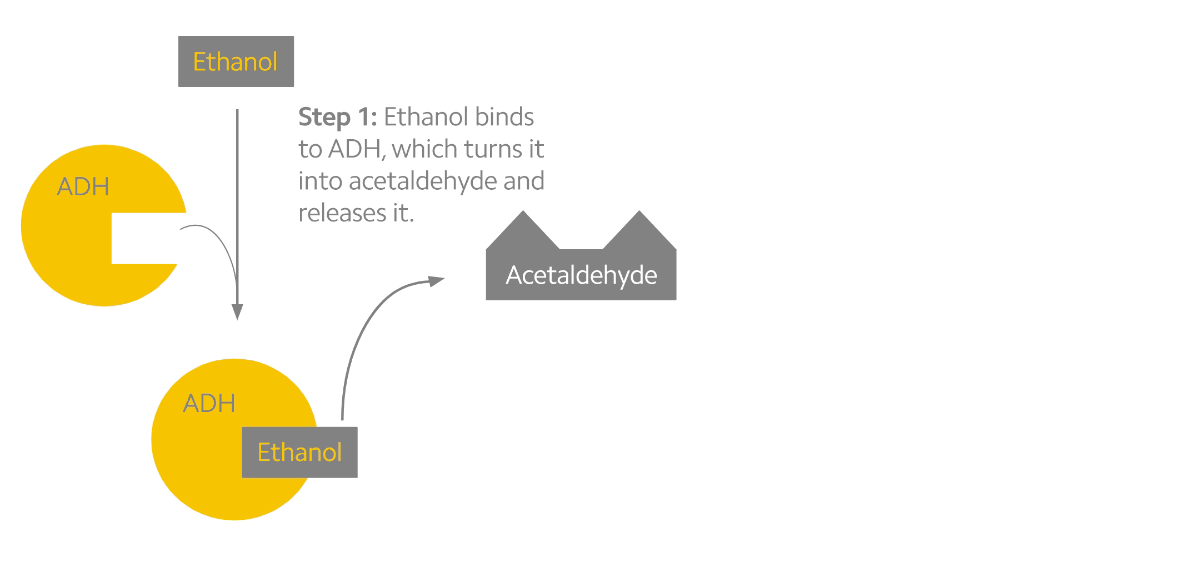How does your body respond to alcohol? Just ask your DNA

In this article we discuss some positive and negative effects of alcohol consumption on human health. The potential health benefits of ethanol are not observed when alcohol consumption is more than moderate (as in the case of binge drinking and chronic alcohol abuse). Severe health complications can develop as a result of excess alcohol consumption.
Euphoria, facial flushing, rapid heartbeat, headache, nausea… if you’ve ever had a drink or two, you may know that we’re talking about some of the effects of alcohol consumption. Some people feel the effects quickly, while others seem to be able to imbibe much more without experiencing symptoms.
The term “alcohol” actually refers to a broad range of chemicals who share some similar molecular features; however, we typically are referring to ethanol when we talk about alcohol. Ethanol is absorbed through your stomach and small intestines where it is then circulated throughout the body via the bloodstream. Several organs are capable of breaking down ethanol, but the primary location for alcohol metabolism occurs in the liver. There, an enzyme known as alcohol dehydrogenase (ADH) converts ethanol into acetaldehyde, a toxic byproduct which the body quickly eliminates using another enzyme called ALDH.

Alcohol metabolism in the body. Ethanol is converted to acetaldehyde by the ADH enzymes (yellow). Acetaldehyde is then rapidly converted to acetate by the ALDH enzymes (pink).
How alcohol affects a person is determined by a number of factors, one of which is their DNA and the ADH1C gene, which is responsible for making part of the ADH enzyme. Variants in the DNA coding for ADH can affect how quickly a person converts alcohol into acetaldehyde.
Most of the negative symptoms associated with alcohol consumption are related to ethanol metabolism and the build-up of the toxic intermediate acetaldehyde. This byproduct causes numerous effects throughout the body including the stimulation of some allergy-related signals. Among these signals is a protein known as histamine, a key factor involved in the body’s inflammatory immune response. Histamine and multiple other signaling proteins are triggered in response to acetaldehyde, which causes facial flushing, increased skin temperature, and a widening of the blood vessels, leading to a decrease in blood pressure.
How strongly you experience these effects is partially dependent on how quickly your body eliminates acetaldehyde from your system. A variant in the DNA coding for the ADH enzyme has been identified that lowers the body’s ability to metabolize ethanol into acetaldehyde, meaning that people with this variant are less likely to experience the negative physical side effects of alcohol. With fewer adverse side effects, people carrying this variant (in combination with another variant in the ADH1B gene) may be more likely to drink more alcohol and thus experience health issues related to alcohol use. Ethanol is also capable of stimulating reward centers in the brain, which can make it an addictive substance.
Despite the negative side effects, moderate alcohol consumption has been shown to have some positive health impacts, including a decreased risk for cardiovascular disease. Studies indicate that this effect is associated with elevated levels of high density lipoproteins (HDL) in the blood. HDL is a type of transport system that carries cholesterol from many areas of the body back to the liver where the cholesterol can be broken down and removed. Because of this action, HDLs are generally considered to be the “good” kind of cholesterol.
Interestingly, the ability of alcohol to have this increase HDL levels appears to be linked to ethanol, rather than acetaldehyde. This may account for results observed in some recent studies which indicated that certain populations of people carrying the “slow metabolizer” DNA variant of ADH1C may experience increased levels of HDL in response to moderate drinking. These studies set the stage for further exploration into how known genetic variants can have an impact on the relationship between alcohol consumption and human health.
Regardless of your genes, moderation is exceptionally important—but if you can help your heart with that glass of merlot? We’ll say “cheers!” to that.